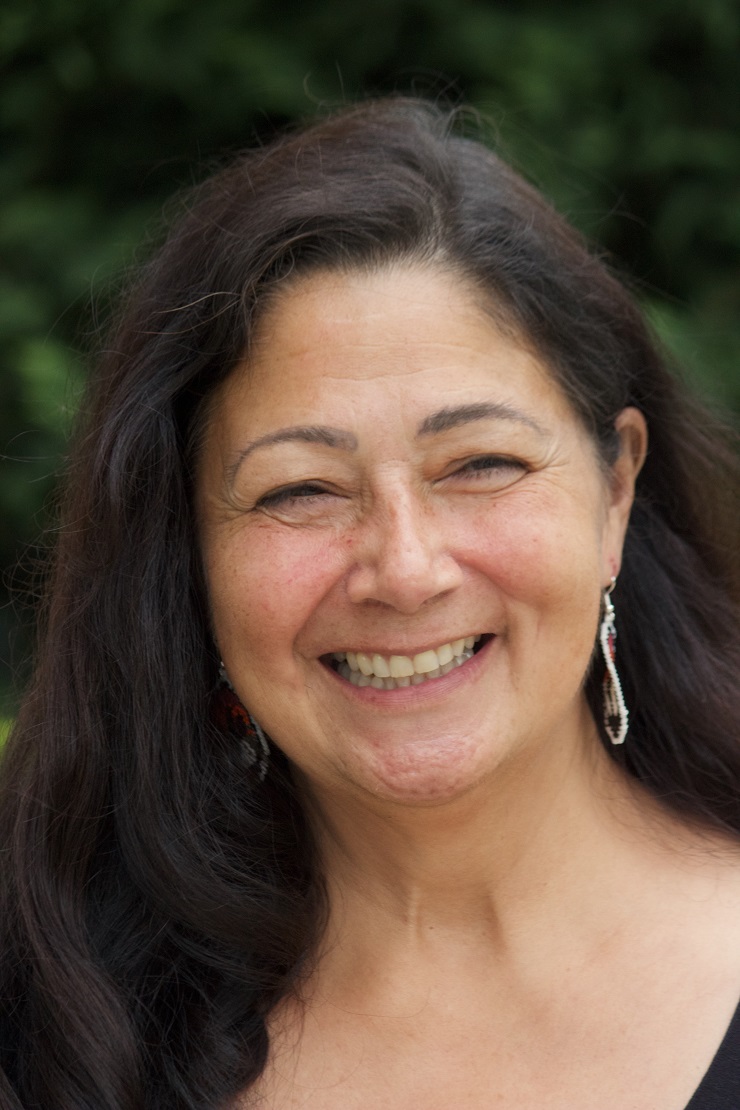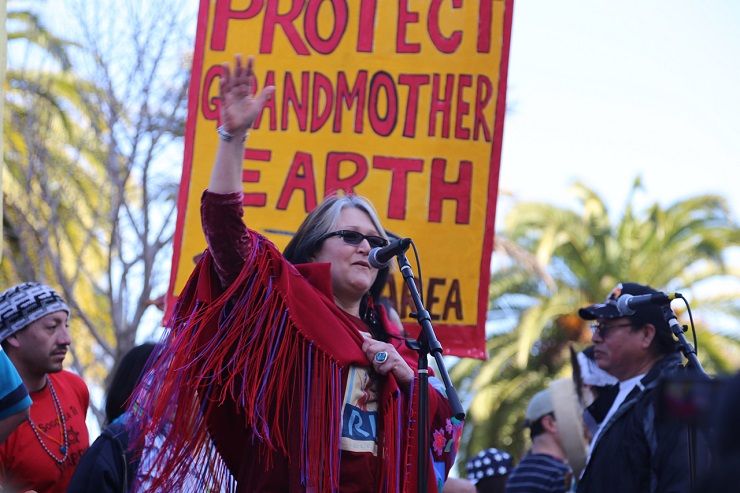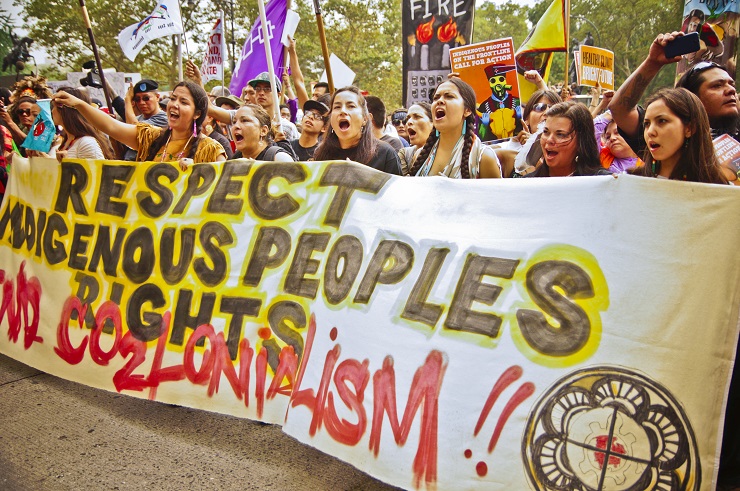
Denise Altvater Carl Roose / AFSC
Denise Altvater serves as coordinator as AFSC's Wabanaki Youth Program in Maine. She has created a supportive web of connection and communication in a region where Native communities have been isolated and abused. With her leadership, the AFSC's Wabanaki Program (Maine) was instrumental in developing the first Truth and Reconciliation commission between a sovereign tribal nation and a U.S. state, and she has recently focused on offering decolonization workshops for faith communities.
Christina Elcock and Lucy Duncan open up a conversation with Denise to explore the importance of decolonization and why it’s vital to heal from the cracks and abuses of a dehumanizing system.
Christina: With the decolonial work you've been doing, both in your program and the decolonial trainings you've been offering, I'm interested to know what action you think we need to take to end the impact of colonization and to begin to decolonize ourselves in our institutions?
Denise: Oh, God, we need to love and connect with the earth, we need to start planting things, we need to stop using plastic and Styrofoam totally. We need to start buying from local farms – organic stuff, we need to stop feeding the industrial food machinery, reduce fuel consumption, we need to start connecting with each other around decolonizing and keep thinking of ways to live in harmony with each other and the earth and other beings. We need to talk with other people about colonialism, we need to be present with what's happening in the moment.
The more we live in the present and not the past or the future, the more invested we are in our lives with each other. I think we need to be a part of this earth and stop thinking that the earth is separate and something that we think we can continue to exploit. I think we really need to stop exploiting the lives of Native people, and people need to stop using their white privilege to be personally enriched and powerful at the expense, detriment, and personal harm of Native people.

Lucy: I asked my son once, "What is decolonization?" and he said, "Oh, it's giving back the land!" And that's a really simple answer, but it's also a really deep answer because it's about giving the land back and shifting one's complete relationship to the land. It's about understanding the land as a totally different thing. Giving back the land means you don't own it anymore, it means the ownership and property model doesn't operate anymore and having a shift of understanding to, "this wasn't ours, this didn't belong to us." Decolonization means shifting power, which the land represents, from a “power over” frame to a “power with” frame. It also means being willing to give up power so that more can claim power, voice, and agency.
I was at the National Museum of the American Indian in Washington, D.C. last month and went through all the [Name of treay?] Treaty exhibits. I was on a tour with this young Chippewa woman, and she showed us the original Treaty between the Wampanoags and Europeans. It depicted two pathways side-by-side in the water proceeding parallel to one another. The idea behind the treaty was "we are going to live side-by-side, not hurting each other's way of life," but what was not mentioned was that the way of life of Europeans was built on disrupting and harming the way of life of others.
I looked at the aspirational nature of that Treaty and was deeply sad; it was a lie from the beginning. I learned from the guide that Europeans learned indigenous languages in order to do harm and to create the treaties they broke with the full intention not to follow through on their promises. Why is it so hard to live out the original vision of the treaty to let people live as they desire? It’s heart-breaking, that early deception, all that was destroyed based on those early lies.
Denise: A lot of times when we try to talk about decolonization, we are afraid to talk about the full truth, because we are afraid that people are going to be hurt or are going to be angry and walk out. If that happens, then it happens, but we cannot be afraid of really bringing out the whole truth even when it's ugly. If we can acknowledge that full truth of the past, if we can embrace it, then we can embrace what's present, because what's present is part of that past.
I'm sick of people saying, "Well, that's in the past." And people saying, "Well, you can't blame me for what my ancestors did." Well, you're still benefitting from what your ancestors did, and even if it wasn't anything that your ancestors did, just the fact that you can have access to what I don't have access to, you benefit, you benefit at the detriment to me. So, if we can look honestly at the truth of the past, then we can commit to creating a more just future. We can do that by pushing through all those obstacles. That's what can make a real difference, but we really have to acknowledge and recognize the privilege and hold ourselves accountable for what happened and what is happening.

Christina: And this is the work that you're doing in your training.
Denise: Yeah.
Lucy: I have one question around Quakers. Quakers migrated to the United States with the Penn charter and there are still Quakers who own land from the Penn charter, which was stolen land. Penn met with the Lenni Lenape on the banks of the Delaware, and things may have been more civil, though he was still settling on stolen land. Things were slightly more civil between the Lenni Lenape and the Quakers until his sons cheated the Lenni Lenape with the walking purchase, stealing acres and acres of land.
Penn was also the first enslaver in Pennsylvania and the first slave-trader, so much of the myth we have about ourselves as Quakers is not entirely true. We participated in colonization and slavery, we weren’t so much more enlightened than any other European settlers, even if we want to believe we are.
I have an aspiration that we renounce Penn or at least be willing to accept the truth about him and not just say he's so great. There is a habit among Quakers to talk about John Woolman, to talk about Lucretia Mott, to talk about Benjamin Lay, to talk about these heroic figures who were very much marginalized within their time as though they were the mainstream of the faith. We don’t claim how moribund and resistant to change the body was and how much it benefitted from colonization of Pennsylvania. We participated in establishing Indian boarding schools: Quakers thought assimilation was better than murder, but cultural genocide and bodily genocide are just two aspects of genocide. We colluded with the cultural genocide of Native peoples in this country. What do you think is important specifically for Quakers and Quaker institutions, which are benefitting from that wealth still to consider in their conversations about decolonization and working against racism?
Denise: Well, personally, I think it would be the same for Quakers as it would be for these other faith organizations to face the truth of their participation that then shapes future action. The Catholic church did much worse than what the Quakers did. There are other faith communities that have done equally as much, some maybe not so, but I think that learning more about racism and Indigenous people and educating themselves about genocide and what has happened in this country and the Doctrine of Discovery is a good place to start.
I think, if they're willing to do that hard piece of work, that they need to educate themselves and think about what their role as white Quakers are and think about what they know about Indigenous people, not just here, but around the world. They can be truth-tellers in vocal ministry, they can be truth-tellers in their Quaker communities, they can search and see how they are privileged, they can be aware of where their blind spots are, they can learn and maybe even try and find shared information because there are different ways of learning.
I think that there are really decent models out there where people can learn a lot, but it depends on how deep you want to go. I think they can practice with other partner faith organizations who have done this work because that's what we're doing. We're bringing different faith organizations together and they're partnering with each other. This Thanksgiving, as a result of the workshop that we did, three churches did a Thanksgiving presentation. They did one last year, and the church that they did it in said that they aren't allowed to do it there this year because they didn’t like what they did.
Lucy: Because it was really the truth!
Denise: Yes, but they can research their own history so they can better understand and present. They can be their own truth-tellers, which would be a really good thing. They can enable others to look at their history, they can sit with Native people and hear what we want, they can witness, they can share our concerns, they can learn about the United Nations Declaration on the Rights of Indigenous Peoples (UNDRIP), and then learn about the Doctrine of Discovery.
Lucy: Thank you, Denise. Robert Shetterly was right, you are somebody who tells the truth, and I know it's cost you and I feel honored to have witnessed some of that truth-telling.
Related Post
Thinking about decolonization as Thanksgiving approaches: A conversation with Denise Altvater part 1
Decolonizing our hearts and minds as people of faith: A conversation with Denise Altvater, part 2
Healing does not require forgiveness: A conversation with Denise Altvater, part 3
Colonialism and late stage genocide: A conversation with Denise Altvater, part 4